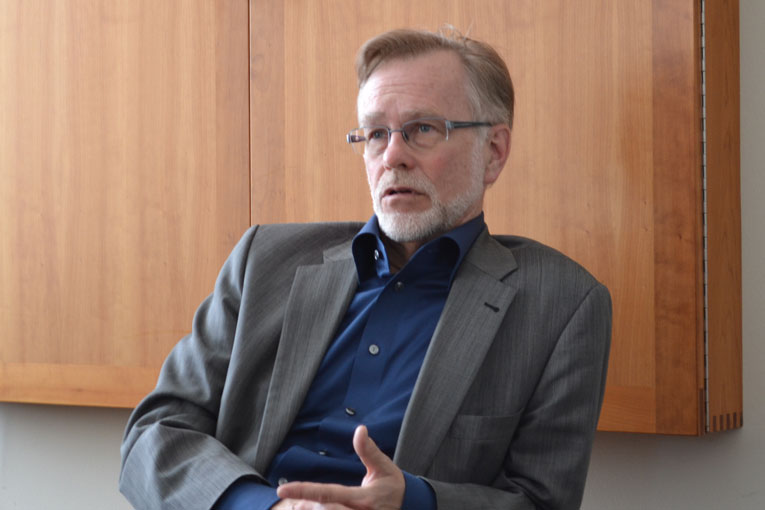
 Ricardo Campi Ricardo Campi |
||
|
Göran K. Hansson (Gothenburg, 1951) opens the doors to his office in the Nobel Forum, at the Swedish capital’s Karolinska Institutet, to Mètode. In the main hall of this emblematic building he unveils, as it is his right as Nobel Assembly Secretary, one of the major scientific news items every year: the Nobel Prize for Medicine or Physiology. This extrovert scientist, of serious countenance but agile eyes, is a recognised expert in the field of interactions between the immune system and atherosclerosis. Not only does he award prizes to other, but he keeps more than a dozen international awards himself. Some of the most important among them are the Anitschkow Award of the European Atherosclerosis Society and the Distinguished Service Award of the American Heart Association. He is also a member of the Royal Swedish Academy of Sciences and the Europa Academy. During the interview, Doctor Hansson reveals in an informal tone the past, present and future of the most prestigious prize in science, which saw its endowment reduced by 20% in order to ensure its survival. For this doctor turned into researcher, the legacy and meticulous analysis of each work is the key to the Nobel Assembly. On the other hand, Doctor Hansson shows his concern about abusive science budget cuts in our country and sends a clear message: cutbacks in science are cutbacks in future. How did Göran K. Hansson end up here? Did you plan it from the beginning? Is it difficult to decide who deserves the Nobel Prize? Are those meetings long? Do you recall any bat times for the Nobel Prize? Any criticism that affected the organisation? What aspect of the Nobel Prize makes you prouder? What is the secret to survive more than a hundred years and still be the most prestigious award in such competitive and fast fields as Physiology or Physics? Today’s situation is very different from the past. Did the Nobel Prize have to adapt? There are other awards coexisting with the Nobel Prize (for instance, we have the new Breakthrough Prize in Life Science, sponsored among others by Mark Zuckerberg, of Facebook, and Sergey Brin, of Google, with a 3-million-dollar award, and the Japan Prize Foundation, with 650,000 dollars as prize). Do you think they are competition for the Nobel Prize? Are you worried about overlapping? Too many awards? Could this lead to a serious problem (scientists focusing on topics or areas more favourable to obtain a prize instead of less important issues)? |
|
«El Premio Nobel es el galardón más prestigioso. Es realmente internacional»
«I do not know if Alfred Nobel realised how intelligent the combination was» |
 Ricardo Campi Ricardo Campi |
«It was annoying for the king to think that foreigners would be receiving Swedish money. But it still happened» |
|
| Concerning the future of the Nobel Prize: Will it last another 100 years? Will you still be the Secretary of the Nobel Assembly? Well… (Laughs). The second question is easy to answer: I will not be the Secretary in a hundred years. And in regard to the first one, of course we would like to keep doing this; it is our goal, because we have been very successful during these first hundred years. And yes, we still think the Nobel Prize will play an important role, today and tomorrow. I think the combination is simply brilliant. I do not know if Alfred Nobel realised how intelligent the combination was. Everyone has an opinion about world peace, everyone reads the Nobel Prize for Literature, and science has undoubtedly benefited from it. Besides, carefully examining and objectively evaluating the nominees makes the way easier for us, gives us assurance for the future. Why do you think the Nobel Prize is so respected in society? I think it has a lot to do with what I said before: careful assessment, legacy and the history behind you. The broad combination covers from physics to peace. People believe we really reward great science discoveries. It also was the first international award; before it started every award was national. There were also protests in Sweden because of this. It was annoying for the king to think that foreigners would be receiving Swedish money. But it still happened. It was a huge change. The press plays a fundamental role in spreading information, and since it is science we develop, what is your opinion on the presence in some newspapers or magazines of scientific journalists without real science experience? Do you think it could be harmful for science? First thing I have to say is I am very impressed by scientific journalists. Most of them are very good. They usually explain what our discoveries and topics are about even better than we do. They are really good mediators between society and us. And they perform magnificently. Of course, there are situations when a journalist covering a Nobel Prize has no idea about the area of the research… However, we have to live with this. What is your opinion on Massive Online Open Courses (MOOC)? Do you read any blog? Why do you think it is so easy for politicians to cut science budgets? Many of our students and young scientists are leaving Spain because of the lack in science investment. It has been called a «brain drain». Are Spanish well received in other countries? Do you know any Spanish emigrant? Until now only two Spanish scientists have won a Nobel Prize, Ramón y Cajal in 1906 and Severo Ochoa in 1959. We rank second in the world in science production. How can we have so few Nobel Prize winners? Is there a system problem with science in Spain? What is the future of a country suffering such a major loss of talented scientists?
Lamberto J. Torralba Raga. Biochemist. Karolinska Institutet (Sweden). |
«I am impressed how scientific research has been built in Spain in the last 25 years»
«The example of Germany is a message for every country to learn: do not cut science budgets or the recovery time will be very long» |
|





